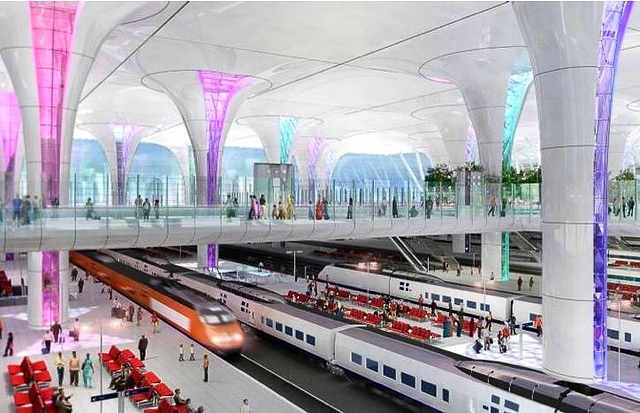
Rs 6642 Cr Project For Redevelopment Of New Delhi, CSTM Mumbai Railway Stations Likely To Be Tendered Out In Next 2 Weeks
In another major boost to Indian Railways’s station redevelopment plans, tenders for upgrading two of the railway stations with the largest footfall in India — New Delhi and Chhatrapati Shivaji Maharaj Terminus (CSMT) in Mumbai — is expected to be invited within two weeks, Business Standard reported.
“The proposals to redevelop New Delhi and Mumbai (CSMT) stations are under consideration of the Public-Private Partnership Appraisal Committee (PPPAC) under the Ministry of Finance. Within 10 to 15 days, we will be inviting tenders for these stations,” said V K Yadav, chairman of the Railway Board.
The redevelopment project of India’s two busiest rail terminals, is expected to garner an investment of Rs 6,642 crore and comes within days of announcement that nine major players including GMR Business, Kalpataru Power Transmission, Cube Construction Engineering Ltd and Monte Carlo Ltd have qualified for redeveloping Gwalior, Amritsar, Nagpur and Sabarmati stations in the public-private partnership model at an estimated cost of Rs 1300 cr.
The four stations are set to be redeveloped with a total built up area of 54 lakh sq ft for commercial development for which total 29 applicants were shortlisted for the Request for Proposal (RFP), the next stage.
With 16 platforms, more than 450 trains and over 4 lakh footfalls on a daily basis, the New Delhi Railway Station redevelopment project is expected to involve an investment of Rs 5,000 crores.
Earlier this year, an exclusive report published in Swarajya provided details on the New Delhi Railway Station redevelopment project. To be developed in phases, the first phase of the project would involve development on approximately 110 acres of land involving the construction of an elevated concourse with segregation of arriving and departing passengers, refurbished platforms with easy access from the concourse level, mezzanine level exclusively for passenger facilities such as lounges, food courts and restrooms, an elevated road network with multiple entry points and exit points and a multi-level car parking facility.
While 72,500 square metre is earmarked for retail activities, 35,000 sqm will be for a hotel and 1,03,000 sqm for an office complex.
The selected players would be able to earn revenues from several components of the project. They include passenger handling fees collected from passengers through ticket sales, revenues from passenger facilities within the station such as retail areas, lounges, parking, advertisement spaces, food and beverages and income from the development and lease of the commercial components.
The ambitious project undertaken by Railway Land Development Authority (RLDA) is expected to be completed over three to four years after the tender is awarded.
The Chhatrapati Shivaji Maharaj Terminus (CSMT) in Mumbai is expected to be redeveloped at a cost of Rs 1,642 crores. Indian Railway Station Development Corporation (IRSDC) will be the nodal agency for this project. CSMT handles around 1300 local and long-distance trains carrying over a million passengers,
The contracts for five station redevelopment projects have already awarded by the Indian Railway Stations Development Corporation (IRSDC) and NBCC India – Habibganj (Bhopal), Gandhinagar (Gujarat), Gomti Nagar (Lucknow), Charbagh (Lucknow) and Puducherry. NBCC has already started work on the two Lucknow stations.
While Habibganj has been awarded under the Public-Private Participation (PP) mode, the other four stations have been awarded based on the EPC (Engineering, Procurement and Construction) mode.
The Union Government’s thinktank NITI Aayog is pushing has been aggressively comprehensive plan for the holistic development of the area around 50 railway stations with the biggest potential to draw private investments.
In October this year, Niti Aayog CEO Amitabh Kant wrote to the Railway Bard chairman VK Yadav and asked him to expedite the station redevelopment project by setting up an Empowered Group of Secretaries to enable faster decision making. NITI Aayog also suggested Indian railways to take these projects on a build-operate-transfer basis, where stations can be developed into economic clusters.
The government has also extended the lease period for the private players from 45 years to 99 years.
The Indian Railways has also roped in five public sector undertakings — NPCC, Engineering Projects, MECON, RITES, Bridges & Roof Co — to provide further momentum to the station redevelopment project.